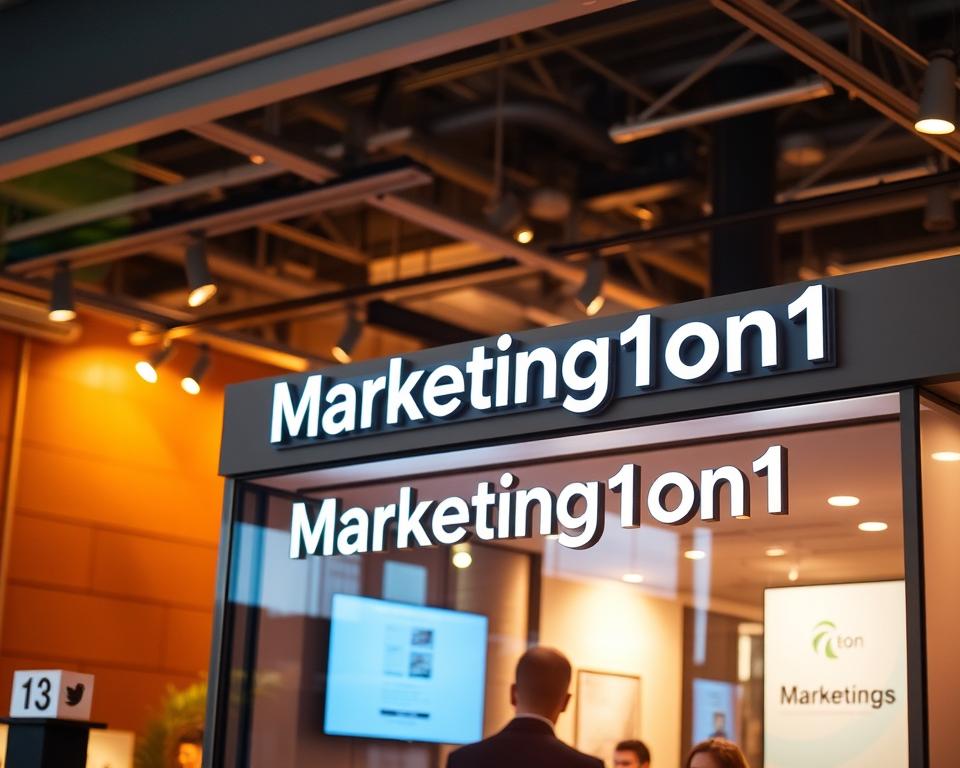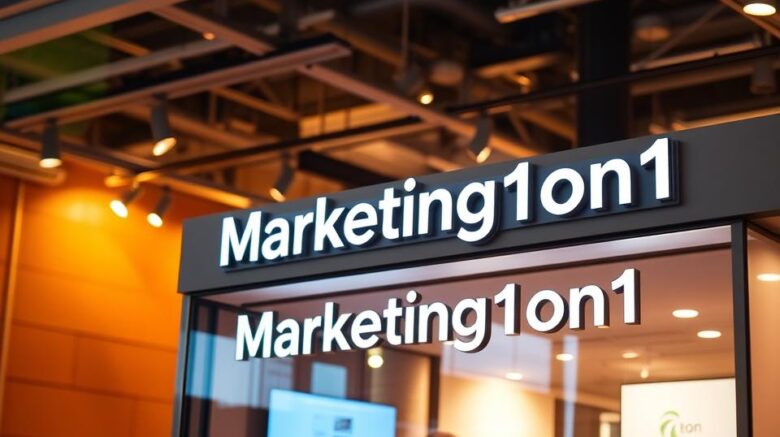1on1 Marketing: Tap Into Personal Customer Connections.
Have you ever wondered why certain brands click with their audience while others fall flat? The secret lies in 1on1 Marketing, a game-changing method that turns generic marketing into personalized experiences. By dialing into personal preferences, it forges a bond that mass marketing simply can’t replicate. This approach shifts the focus from mass marketing to tailored strategies that speak directly to each customer’s heart.
By adopting 1on1 Marketing, businesses can build more meaningful connections. They create strategies that genuinely strike a chord with their audience. Here, we delve into the essence of 1on1 Marketing and how it allows brands to engage with customers individually, 1on1.
Marketing Strategy Evolution
The marketing landscape has seen a significant transformation over the years. At first, marketers deployed broad-brush strategies aimed at average customers. Now, the demand is for engagement through tailored conversations. This shift emphasizes the need to understand each customer as an individual, not just part of a group.
With marketing’s evolution, it’s clear that generic tactics fall short. Modern strategies aim to create meaningful interactions, building relationships instead of just pushing products. By leveraging data insights, marketers move to tactics that cater to each customer’s unique preferences.
Such evolution not only strengthens customer bonds but also boosts loyalty and retention. In today’s crowded market, brands offering personalized journeys stand apart. They create spaces for dialogue and engagement, ensuring customers feel appreciated.

| Strategy Type | Characteristics | Example |
|---|---|---|
| Generic Approach | Broad messaging, wide reach | Generic ad campaigns |
| Tailored Tactics | Individual focus, fine-tuned reach | Segmented email flows |
Why Personalization Matters in B2B Marketing
As B2B marketing evolves, personalization is indispensable. Professionals aim to increase conversions via personalized 1on1 strategies. Studies show that many see this method as key to keeping customers. In a fast-paced environment, engaging audiences effectively is vital.
Customization overcomes the hurdle of capturing attention. It makes sure messaging resonates with each individual’s tastes. This focus on individual experiences helps brands stand out in crowded markets.
The rise in customer touchpoints has heightened the need for personalized engagement. Brands that adopt personalized strategies meet customer needs and build lasting connections. Such an approach offers a distinct advantage in today’s market.
Understanding 1on1 Marketing
One-to-one Marketing focuses on customizing experiences for each customer. It uses data insights to craft personalized engagement strategies. By concentrating on individual experiences, it fosters robust customer bonds.
For example, a coffee shop where the barista remembers a customer’s favorite order illustrates one-to-one marketing. This simple gesture demonstrates how attending to preferences bolsters satisfaction. It turns a simple transaction into a memorable experience, building loyalty.
To implement one-to-one marketing, companies must deeply understand customer data. They analyze behaviors and preferences to tailor their messages. This ensures their marketing efforts connect with individual tastes, leading to stronger customer connections and higher satisfaction.
As companies pursue personalized engagement, they recognize that customization underpins lasting success. Those mastering bespoke experiences gain substantial rewards.
Benefits of Personalized Customer Engagement
Tailored engagement offers numerous advantages for today’s brands. It dramatically increases satisfaction by delivering experiences that align with individual needs. Research reveals that 80% of consumers favor brands offering customized interactions. This highlights the significant impact of customized marketing.
Personalized loyalty programs boost retention. By addressing specific pain points and preferences, businesses create an environment where customers feel valued and understood. This link promotes repeat business, increasing profits.
Tailored marketing yields better conversion rates. Tailored recommendations and targeted content guide customers through the sales funnel, improving their journey from consideration to purchase. Highlighting the benefits of personalized marketing enhances brand perception and positions businesses for success in a competitive market.
| Benefit | Description | Impact |
|---|---|---|
| Customer Satisfaction | Personalized experiences enhance overall customer happiness. | Increased chances of repeat purchases. |
| Rewards Tailored to You | Custom offers increase customer engagement. | Enhanced retention and brand loyalty. |
| Sales Upsurge | Targeted content spurs customer actions effectively. | Growth in sales and revenue. |
Personalization Challenges
Brands face numerous hurdles when aiming to implement personalized marketing. Collecting quality data is a primary obstacle. High-quality data is key for segmenting audiences effectively. Without this, campaigns miss the mark, squandering opportunities and resources.
Brands targeting specific audiences must navigate the fine line between personalized and generic communication. Large corporations often find it hard to maintain one-to-one interactions while heavily relying on automation. This risks eroding the personal connection customers value. – 1on11 on 1 Marketing
Smaller businesses also have their own set of challenges. They often struggle to define their messaging, hindering their ability to leverage personalized marketing’s benefits. Recognizing these challenges is essential for marketers aiming to improve their strategies and engage customers more effectively.
Tools Fueling Personalized Marketing
Innovative tech is transforming personalized engagement. CRM systems are pivotal for managing customer data. They help businesses manage customer data, vital for creating tailored marketing experiences. A strong CRM enables deeper insight into preferences and behaviors.
AI in marketing improves personalization by enabling more accurate targeting and automating tasks. Machine learning algorithms sift through vast datasets to uncover trends and consumer behaviors. This enables marketers to refine their strategies. Automation reduces manual effort and optimizes campaign impact.
Research shows 72% of marketers rely on CRM for personalization. Marketing automation tools are used by 55% to streamline campaigns. These technologies empower businesses to offer customized experiences on a large scale. They ensure campaigns connect with individuals rather than broad audiences.
Merging these tools creates a dynamic engagement framework. The rapidly changing landscape prompts marketers to embrace advanced tools. These tools not only improve efficiency but also strengthen connections with their audiences.
Best Practices for Personalizing Marketing Efforts
Effective personalized marketing hinges on key best practices. They guarantee resonance and improved engagement. Key components include:
- Audience segmentation is essential for targeting specific groups based on common traits. It enables precision messaging, increasing engagement rates.
- Using refined communication improves the customer experience. Uniform, relevant messaging across platforms builds trust and fosters ongoing engagement.
- Adopting testing strategies, like A/B testing, is critical. It identifies the most effective tactics by comparing messages and metrics.
Leveraging customer data is crucial to grasp behaviors and preferences. Marketers should regularly analyze this data to refine their strategies. By adhering to these best practices, brands can craft a personalized approach that resonates with their target audience.
Creative Tactics for Personalized Marketing
Creative marketing strategies are key to improving personalized experiences at every customer touchpoint. Companies send emails tailored to tastes, amplifying impact. By studying past purchases, companies can suggest products that feel right, boosting sales.
Segment-specific videos are another smart tactic. They capture attention and build emotional bonds with viewers. Adaptive loyalty programs that align with behaviors reward meaningful interactions, enriching the journey.
| Creative Tactic | Description | Benefit |
|---|---|---|
| Personalized Emails | Emails designed to individual preferences and behaviors. | Boosts engagement and conversion rates. |
| Suggested Products | Suggestions based on previous purchases and browsing history. | Boosts sales and customer satisfaction. |
| Segmented Videos | Video content designed for specific segments. | Deepens brand connection and engagement. |
| Adaptive Rewards | Rewards systems that adapt to individual behaviors. | Increases loyalty and repeat business. |
Companies gain significantly by weaving customized offers into social media, email, and app alerts. Every touchpoint is an opportunity to showcase commitment to personalized engagement. It crafts memorable experiences, making brands stand out in a crowded landscape.
Future Trends in 1on1 Marketing
The world of 1on1 marketing is rapidly changing, driven by the latest marketing trends. AI will power campaigns tailored to individual requirements. It enhances campaign outcomes and forges connections by delivering timely, relevant content.
Another key trend is the importance of omnichannel experiences. Consumers demand seamless transitions across social, email, and other channels. Brands must ensure consistent messaging to meet these expectations. Knowing interaction points helps craft a cohesive journey, bolstering loyalty.
Adapting to these shifts, ethical data practices will become essential for maintaining trust with consumers. Amid rising privacy concerns, transparency and responsibility in data handling are non-negotiable. Focusing on ethical data usage not only meets regulatory standards but also builds stronger customer relationships, leading to increased loyalty in the future of 1on1 marketing.
